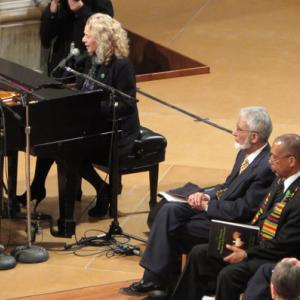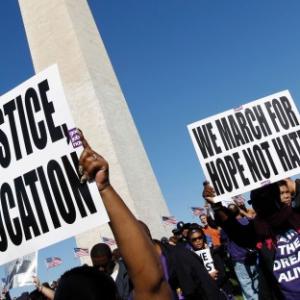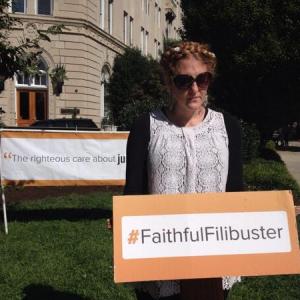
Anna, a native of Cleveland, Ohio, comes to Sojourners most recently via San Francisco, although to her recollection she has moved about 10 times during the past 5 years to pursue educational and professional opportunities. She graduated with a BA in political science after studying at Bryn Mawr College and The Ohio State University. In 2012, Anna received her MA in international development from Eastern University’s School of Leadership and Development.
Passionate about issues at the nexus of faith and social justice in today’s world, Anna is specifically interested in refugee and immigrant assimilation into the United States. Experience working at a Columbus-based refugee resettlement agency and teaching citizenship classes in Ohio and California solidified her resolve to press into places where she can build a bridge of love and trust to others of diverse and often harsh backgrounds.
Anna is excited to step into the Sojourners community as campaigns assistant. In her role, she provides support to the campaigns team including policy research, issue advocacy, and online activism. She is grateful for Sojourners being a platform to reinforce her intense intellectual commitment and desire to make a meaningful contribution to the world through her work and life.
In her free time, Anna enjoys spending time in nature, running, thrift shopping, and trying (and attempting to replicate) ethnic cuisines. She loves people and she loves to learn, and she loves to learn from other people. She looks forward to exploring DC in the coming year, after which she hopes to return to the West Coast.
Posts By This Author
In the Shadow of 'Citizens United'
Last week marked the fourth anniversary of the landmark Supreme Court case Citizens United v. Federal Election Commission. In a 5-4 ruling, the court ruled that corporations are entitled to the same free speech rights as individual humans as guaranteed under the First Amendment.
The political repercussions of Citizens United include the rise of “Super PACs” — political action committees that can raise and spend unlimited amounts of money, independent of direct campaign contributions, to influence politics. The power yielded to such corporations, as well as indiscriminate spending allowance, has deleterious effects upon our democracy.
Because money talks, big money will talk a lot louder, drowning out the voices of average Americans trying to exercise their own civic rights. Politicians are undoubtedly more apt to respond to the requests of companies that shelled out hundreds of millions of dollars on supportive campaign politics than to the needs of a college graduate or working family who donated 10 bucks. Doesn’t exactly smack of sound democratic governance.
Is Poverty Killing our Kids?
Despite all the modern conveniences of the 21st century, our information-saturated culture, an exhaustive supply of self-help books, and giant advances in medical technology, doesn’t it seem like our society is more stressed, our anxiety higher, and more of our kids prescribed behavior modification drugs?
What if one of the reasons for our strung-out culture was the social, emotional, mental, and physiological outworking of the effects of poverty?
In the latest release of the Shriver Report, Dr. Nadine Burke Harris, founder of the California Pacific Medical Center’s Bayview Child Health Center, has found through medical research and experiences of her patients that the stress of poverty can be manifested in alarming behaviors and predispositions.
A Big Thank You to the Heroines in our Lives
Women do a lot of work: Moms, grandmothers, aunties, sisters, daughters, wives, teachers, coaches, and any additional caregiving, mentoring position that fills in our lives. Take a moment to pause and reflect on the number of women who have helped you become the person you are today.
In the latest Shriver Report, NBA star LeBron James writes a meaningful tribute to his mother, Gloria, honoring her dedication as a parent and the sacrifices she made in raising her son as a young single mom. Because Gloria was just 16 years old when LeBron was born, they lived with his grandmother. When Gloria’s mother passed away three years later, she and her young son were on their own.
Still a teenager, Gloria did not have the support, education, or resources to sustain her family. The house was lost, and she and her son moved around frequently — a dozen times in three years — counts LeBron.
He writes that “My mom worked anywhere and everywhere, trying to make ends meet. But through all of that, I knew one thing for sure: I had my mother to blanket me and to give me security. She was my mother, my father, my everything. She put me first. I knew that no matter what happened, nothing and nobody was more important to her than I was. I went without a lot of things, but never for one second did I feel unimportant or unloved.”
In effort to model Gloria’s example of devotion, LeBron now takes an active role by helping other kids of single-parent homes through the LeBron James Family Foundation and the Boys & Girls Clubs of America.
“The truth is that everything I’ve learned about being a parent to my boys … I learned from my mother,” he writes in his letter of appreciation to her. “Everything I know about being loving and caring, and sacrificing and showing up and being present in my children’s lives—I learned all of that from her example.”
Without his mother’s influence, would LeBron be the same LeBron?
Religion, Scripture, and the Value of Women
The third edition of the Shriver Report, a media initiative spearheaded by Maria Shriver to call public attention to women’s evolving role in the home, workplace, and society, was released this month.
With a large body of articles, research, polls, data, and personal stories, the report assesses the unique needs, pressures, and realities women face. Contributors within the faith, health, academic, economic, and political communities are represented, coupled with intentional cultural and social diversity. This gives the Shriver Report a richness of deep and thoughtful voices. The aim is to strike up provocative, meaningful, national conversations on how progressive policies can be better directed to advance gender equality in the United States.
One of the most eye-catching article headlines for me in reading the report was “ Are Women Devalued by Religions?” In the article, sister Joan Chittister remarks on how our assumptions about religion influence our actions, and how the outworking of our actions shapes the norms and policies we guide our lives by. Unfortunately, these assumed beliefs can lead to commonly accepted views that completely distort what God has to say about women.
5 Myths About Minimum Wage
It’s a new year, and Congress is back in session.
One of the top issues expected to be debated in 2014 is a hike to the federal minimum wage. 13 states have instituted wage increases. President Obama has supported raising the minimum wage throughout his presidency. Most recently, he shared his approval of new legislation proposed by Sen. Tom Harkin and George Miller (D-Calif.) that would raise the minimum wage to $10.10, up from it’s current $7.25.
Critics of the Harkin/Miller bill are quick to decry any wage increase. The usual arguments are trotted out to combat progressive pay for low-wage earners. Here are five commonly perpetuated myths about minimum wage. Hopefully, their exploration will shed a more accurate light on this contested issue.
A Time to Grieve, a Time to Remember
To mark the one-year anniversary of the Sandy Hook Elementary School shootings, which left 20 students and six adults dead, a vigil for victims of gun violence was held at Washington National Cathedral last week.
The vigil, sponsored in part by the Newtown Foundation, was a service to remember and honor the more than 30,000 people who lose their lives to gun violence each year. It provided a space for the community to come together in prayers for hope, peace, and love.
After three minutes of silence during the calling bells, a trio of faith leaders, including a rabbi, a Sikh leader, and a Christian minister, offered up calls to prayer. At his turn to speak, Dr. Rajwant Singh affirmed that “whichever way we reach out to God, we can become separated from each other by ignorance, hatred, and violence.” “Each heart is God’s heart, and each body is God’s temple,” Singh continued, “so if you want to honor God, don’t take anyone’s life, or break anyone’s heart.”
Time for Acknowledgement: Christian-Run Native American Boarding Schools Left Legacy of Destruction
The Native American narrative remains largely unknown in U.S. majority culture. It is glaringly absent in most school curriculums, and remains unheard in modern dominant politics. One crucial stream of Native culture I’ve recently come to learn about is the destructive legacy of Christian-run Indian boarding schools.
What began with genuinely good intentions (in those days, “European” norms were viewed as superior, “sameness” seemed like a good idea, and the threat of legitimate genocide lingered over tribes) rapidly deteriorated, with Christian boarding schools becoming institutions of forced assimilation and abuse.
Beginning in the 1800s and lasting into the 20th century, Native children were forcibly removed from their families and sent to live in boarding schools. Finding the task of “civilizing” Native adults beyond its ability, the federal government delegated the task of “normalization” to churches, which could educate, or, inculcate, children from a young age.
Saving Both Souls and Soil
Many believers are familiar with the term “medical missions.” Less well known, though a growing awareness is popularizing the movement, is the field of environmental missions. The idea’s biblical base is to combine God’s creation care mandate with the additional call of Christ’s “great commission.” What that means and looks like and how it can be cultivated into fruition is the subject of Lowell Bliss’s new book, Environmental Missions: Planting Churches and Trees. Bliss is the director of environmental missions organization Eden Vigil.
The purpose of the newest category of missions, Bliss asserts, is two-pronged. The goal is to integrate the dual aims of the environmental missionary: to care for the environment and to make disciples. Why? Because God is a both/and God, not an either/or God. He cares for both people and the planet; he is concerned with saving both souls and soil. Following Jesus’ example, then, we can be both people and tree-huggers.
Student Group to Host 'Catch an Illegal Immigrant Game' on Texas Campus
Editor's Note: Thanks to pushback from students, the University president, and faculty in departments like the Latin American Studies department, the event was cancelled. There is still going to be a counter protest in solidarity with immigrants. Information can be found here.
The Young Conservatives of Texas is staging a mock immigration sting Wednesday on the University of Texas at Austin’s campus. According to YCT’s Facebook event, these are the rules of the game: “There will be several people walking around the UT campus with the label ‘illegal immigrant’ on their clothing. Any UT student who catches one of these ‘illegal immigrants’ and brings them back to our table will receive a $25 gift card.”
Lorenzo Garcia, the chairman of the campus chapter of YCT, has been reported as saying that he organized the event with the intention to “spark a campus-wide discussion about the issue of illegal immigration and how it affects our everyday lives.”
He has certainly succeeded in sparking a discussion, but he’s also highlighted the deep-seated prejudices at the root of much of the opposition to immigration reform. Rather than have a serious “discussion,” ignorance will be perpetuated.
Vulture Funds Are Immoral Profit Makers
Among the largest phenomena that have arisen from foreign debt crises and loan repayment structures are predatory hedge funds, known as vulture funds. Simply said, vulture funds intentionally target the debt of financially distressed nations. They monitor the likelihood of a country’s ability to gain international debt relief. Right before the country receives aid, vulture funds buy up the nation’s debt. Then, they call in their debt bonds, suing the country once it receives resources that help debt cancellation. The result is that vulture funds, after buying distressed debt for pennies on the dollar, turn around and sue to recover up to ten times the purchase price.
Because vulture funds locate themselves in such offshore tax havens as the Cayman Islands, the companies or individuals remain a secret. Many times, there is no source of reliable information on who actually owns them, making accountability impossible.
Justice in the Courts? Not for This Man
Duane Buck currently sits on death row in a Texas jail cell partly because he is black. He has been held since his 1997 capital sentencing hearing, which was influenced by blatantly racist testimony. Trial prosecutors relied on erroneous “expert testimony” provided by psychologist Walter Quijano, who claimed African-Americans are more liable to commit future acts of violence than non-African-Americans.
Swayed by the misinformation, jury members accepted as truth Quijano’s claims. According to Texas law, a jury finding of “future dangerousness” is a prerequisite for a death sentence. Consequently, Buck was convicted in the fatal shootings of Debra Gardner and Kenneth Butler and issued the death penalty.
Organization Outlines Continued Efforts to Cut Poverty in Half
Last week, Half in Ten released its third annual report on its commitment to and efforts toward U.S. poverty reduction. The Half in Ten Campaign is a joint project of the Center for American Progress Action Fund, the Coalition on Human Needs, and The Leadership Conference on Civil and Human rights, with a mission to build political and public will to cut the nation’s poverty rate in half in 10 years.
In her remarks, Neera Tanden, president of the Center for American Progress, stressed the need to move the conversation in Washington away from implementing austerity measures that ultimately harm the poor.
Scripture also reminds us over and over again to care for the least of those in society, including widows, orphans, and immigrants in our midst. We are called to be generous with what we have. Labor Secretary Thomas Perez echoed this truth at the Half in Ten meeting, urging that at this time, we need to “turn toward one another, not against one another.”
One Year Later, Examining Climate Change and Hurricane Sandy
This week marks the one-year anniversary of Hurricane Sandy, the superstorm that decimated metropolitan areas of the East Coast last fall.
Damage from the storm resulted in more than 100 fatalities, with an estimated loss of $65 billion. Thousands of homes were lost, and millions were without power for days. Thousands of flights were canceled along the eastern seaboard, and multiple public transit services were suspended, including Amtrak and New York City’s bus and subway system. Even the U.S. economic structure ground to a halt, with NASDAQ and the New York Stock Exchange closing to buckle down before the deluge.
One year later, we reflect on reconstruction efforts post-Sandy. We also pause to assess the role of climate change, exacerbated by human actions, in the creation and severity of the storm.
Why the Silence on U.S. Oil Spills?
Occurrences of oil spills in several states have garnered little media attention in the last few years. In some cases, prompt reports are recorded, yet in others, days have gone by before the authorities are alerted and the spill becomes public knowledge.
The most recent episode happened Oct. 15, in Port of Long Beach, Calif. Upon discovery of an oil leak, Exxon Mobil announced that it was temporarily suspending operations of its pipeline system. The pipeline, which connects to the company’s refinery in Torrance, carries up to 155,000 barrels of oil per day. Exxon filed documents with the California Emergency Management Agency that claimed the leak did not affect waterways, although the company was ordered to pay a $236 million fine for contaminating groundwater in New Hampshire this past April.
Another spill was initially discovered on Sept. 29 by North Dakota farmer Steve Jensen, the Associated Press reported. While harvesting wheat, Jensen discovered the leak in his field “spewing and bubbling 6 inches high.” The rupture was a break in Tesoro Corporation’s underground pipeline. While it remains unconfirmed, early evidence cites that corrosion on the 20-year-old pipeline is the cause of rupture. At least 20,600 barrels of oil flooded the 7-acre spill zone, equal to about 7 football fields.
The delay in making public North Dakota’s oil spill proves as worrisome as the spill itself. It took 11 days after the spill’s discovery for it to become public knowledge. Officials claim they were not aware how extensive the spill was, but critics point to the state’s financial benefits in the recent gas and oil boom as reason for the authorities’ hesitancy in coming down on oil companies. But economic incentives shouldn’t diminish the serious need to weigh environmental risks and costs.
The cases begin to pile up.
Here Comes the Sun ... on Capitol Hill
When I began to read, I started by going through the Psalms. An elderly gentleman paused to listen, and then requested if I could read aloud his favorite, Psalm 91. As I read it, he also began to softly quote the verses by heart, praising God and saying “hallelujah” before thanking me and walking on.
Later, a local pastor from the District Church in Colombia Heights came to read. We met a couple visiting from Louisiana. The wife was a furloughed federal employee with Immigration and Customs Enforcement. It was interesting to hear her point of view working first-hand with immigrants in a deportation capacity. She said as a Christian, it is sometimes very difficult to find a balance between desiring to deport violent criminals, and also wanting to keep hardworking, law-abiding immigrant families together. She and her husband thanked all who were participating in the Faithful Filibuster for keeping Christ present during the government shutdown.
As the next speaker from Salvation Army was reading, several teens participating in a rally at the Supreme Court came to ask about what we were doing. After explaining the filibuster’s mission, a young boy thanked us, shook hands, and said “God bless you.”
Mayors Against Illegal Guns Brings Rally to D.C.
The reality is bleak: 33 Americans are killed and 260 wounded from gun violence daily. Yesterday, as the culmination of its No More Names bus tour, which reached 25 states in 100 days, Mayors Against Illegal Guns rallied at the Capitol to urge Congress to pass a bill enforcing mandatory background checks for potential gun owners.
Spearheaded in 2006 by Boston Mayor Thomas Menino and New York Mayor Michael Bloomberg, MAIG began with 15 mayors, and has since grown to more than 1,000. The group’s goal is to make American communities safer by reducing the number of illegally obtained guns and by holding dealers accountable for potential gun-purchasers.
At the Hill gathering, representatives from myriad groups came together to advocate for stricter background checks and to push Congress out of their inaction. Tuesday, the Senate postponed a hearing on the legality of “Stand Your Ground” laws — on the heels of Monday’s Navy Yard gun violence.
Congressional representatives, mayors, police officers, military veterans, NRA members, women’s organizations, advocacy groups such as Mothers Demanding Action, faith community leaders (rabbis, priests, and pastors), university groups, children, gun violence survivors, and family members of those who have lost someone to gun violence were all in attendance at the No More Names rally. A broad coalition: racially, socioeconomically, and generationally diverse, as indiscriminant as the bullets that affect us all.
In Hearing on Obama’s Climate Action Plan, Star Witnesses But Few Meaningful Questions
This Wednesday on Capitol Hill, the House subcommittee on Energy and Power held a hearing to discuss the Obama administration’s climate change policies and activities. The policies in question were the president’s Climate Action Plan, announced this summer, which has three main pillars:
- cutting carbon emissions,
- leading international efforts to combat climate change, and
- preparing the United States for climate change impacts.
The Environmental Protection Agency Administrator Gina McCarthy and the Energy Secretary Ernest Moniz were present to answer questions about the president’s plan, which works with new and existing programs in both agencies to reduce our climate change pollution and increase our resilience to climate change. Some of the programs are required by a recent Supreme Court decision that labeled carbon dioxide a pollutant; others, as Moniz pointed out, would happen to carry the benefit of energy efficiency.
For some members of Congress, this is a problem because they do not wish to cede any ground to the executive. For others, it is a problem simply because they do not wish to do anything about climate change.
Is SNAP Congress’ New Hunger Games?
House leaders are proposing a massive cut to SNAP (Supplemental Nutrition Assistance Program), America’s frontrunner in combatting hunger. This new proposal consists of a $40 billion reduction in funding, and SNAP households across the board would be feeling the pinch beginning as soon as November.
Potential cuts reveal stark and sobering statistics that millions of Americans would face:
- The average benefit per person, per meal would decrease to below $1.40, dangerously low to maintain the minimum standards of a healthy diet;
- 210,000 kids would be cut from free school meals;
- SNAP cuts would be the equivalent of taking away 21 meals per month from a four-person household; and
- 170,000 veterans would lose out on food benefits.

















